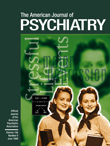Maternal Smoking During Pregnancy and Risk of Criminal Behavior Among Adult Male Offspring in the Northern Finland 1966 Birth Cohort
Abstract
OBJECTIVE: The goal of this study was to test the hypothesis that maternal smoking during pregnancy is associated with greater risk for criminal behavior of the offspring in adulthood. METHOD: An unselected, general population cohort composed of 11,017 subjects (5,636 men, 5,381 women) was followed up prospectively from the sixth month of pregnancy to age 28 years. Interviews with the mother during the pregnancy, health records, and an assessment of the offspring at age 1 year provided information on risk factors. The Ministry of Justice provided information on criminal offenses for all subjects. RESULTS: Because of the low rate of criminal offenses among women, the present analyses are restricted to men (N=5,636). Compared to the sons of mothers who did not smoke, the sons of mothers who smoked during pregnancy had more than a twofold risk of having committed a violent crime or having repeatedly committed crimes, even when other biopsychosocial risk factors were controlled. While maternal smoking during pregnancy alone explained 4% of the variance associated with violent offenses among male offspring, it was not significantly associated with nonviolent offenses among male offspring. When maternal smoking during pregnancy was combined with a maternal age of less than 20 years, a single-parent family, an unwanted pregnancy, and a developmental lag in walking or talking, the odds ratios for violent offenses increased up to ninefold and for persistent offenses up to 14-fold. CONCLUSIONS: Maternal smoking during pregnancy is associated with violent offenses and persistent offenses, but not with nonviolent offenses, among male offspring in adulthood.



